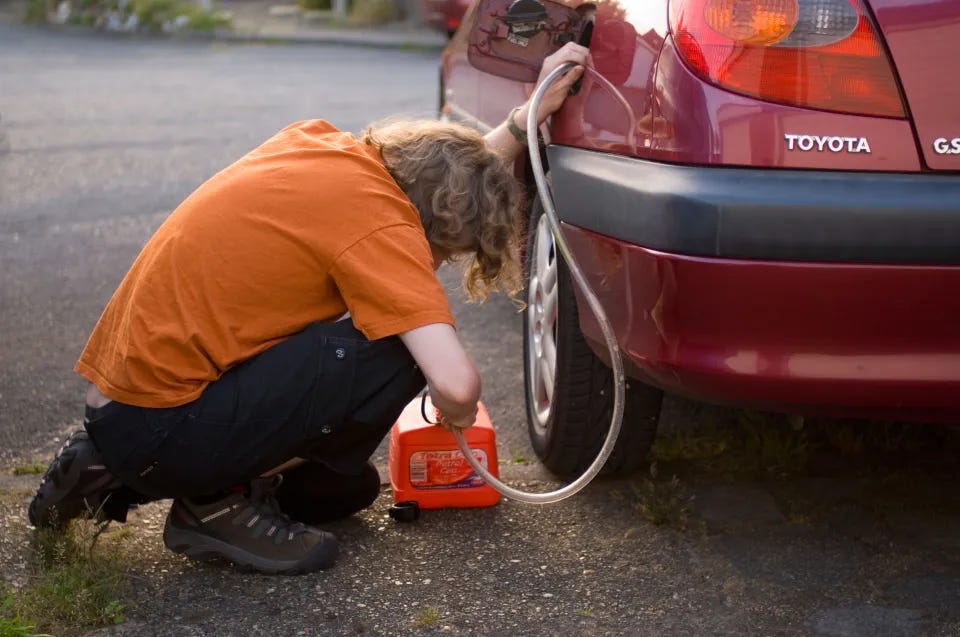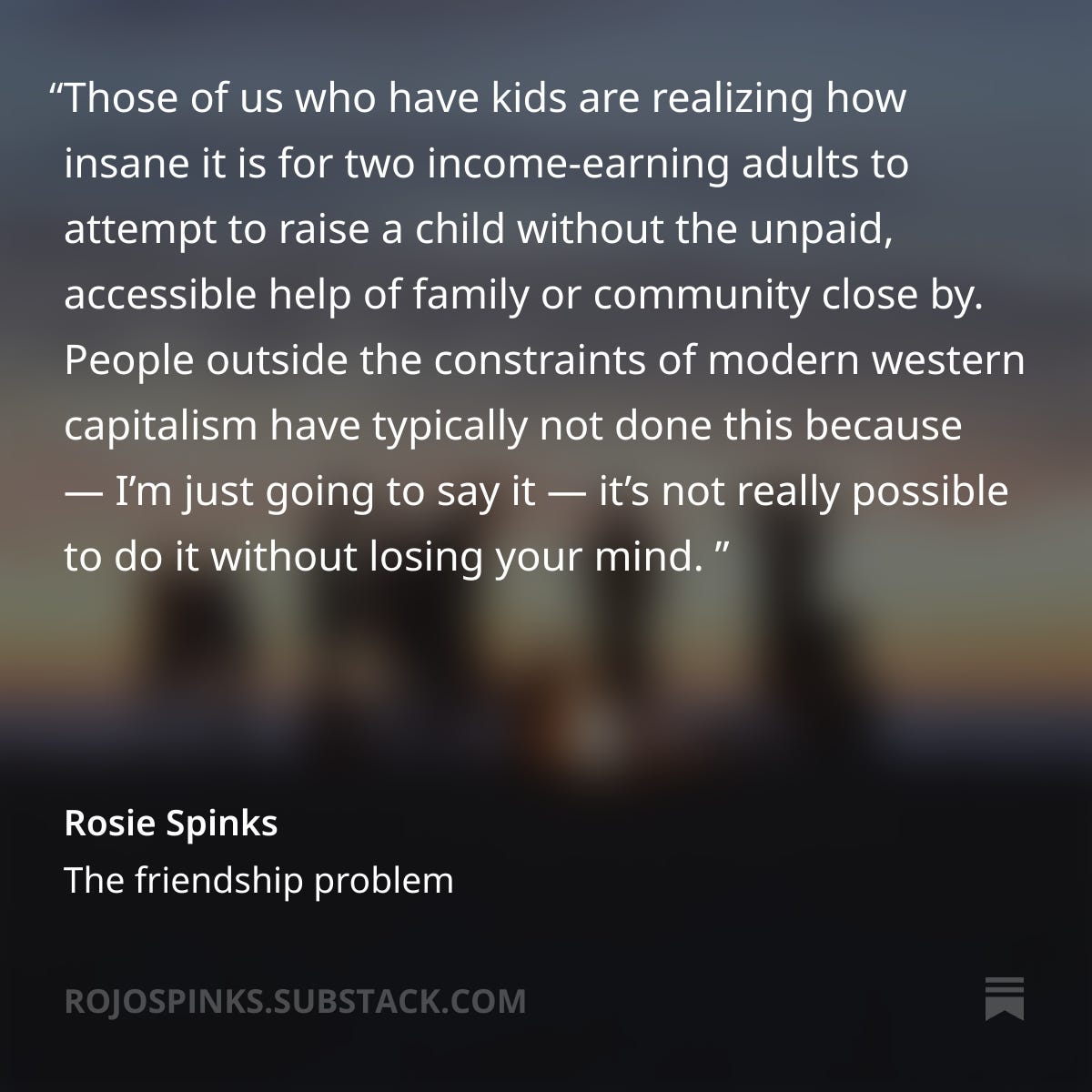#13 - You're not a coldhearted monster. (Probably).
Care feels harder when you're a puddle of exhaustion. We need a world that leaves us with more.
This newsletter follows on from this discussion of the fences and hurdles that make care and connection more difficult:
“But before we make it sound like anyone who doesn’t have direct care responsibilities is a cold-hearted monster who just chooses not to help, we need to recognise how much harder it is to offer care and connection in a world built this way. If accessing care is tricky, offering it is, too.”
Where did the village go?
I’ve discussed earlier in the series how increasing amounts of human energy have been directed towards profit and production. Most of us would simply call this “work”, but in reality, it's no more or less effort than many other contributions to human flourishing; it's just had better branding and compensation under capitalism.
It’s hard to help others and remain connected when you’re at work. And it’s no easier after work when you’re completely drained from it. It’s exponentially harder when it’s not just a few of us who are knackered but almost all of us. This is not a discussion vilifying paid work, or forging a career, it is however an exploration of what happens when those things take up a disproportional amount of our time and energy as a society.
As I outlined in “Lifters, Leaners and Social Glue”, the price of long hours and increased productivity in paid work isn’t just borne by employees, but by the network of carers and connectors who ensure that our human needs and responsibilities are met. As Cathy Reisenwitz notes, this is becoming increasingly unsustainable:
“Our work culture and norms are built around a status quo that no longer exists. For a 25-year stretch, middle-class white men could work long hours because they had stay-at-home wives. Everyone else throughout space and time has worked long hours inside and outside the home while their kids ran around every day for hours at a time with minimal supervision by extended family and neighbours.”
With grandparents retiring later, most parents being required to work at least some of the time, and the spare time extended family/neighbours/friends had now redirected elsewhere, the communal pool of energy available for unpaid care has radically shrunk. It’s not that people don’t want to care and connect, it’s that all too often there’s not much left in the tank to do so.
Where is the village? Over the last few decades, it’s been siphoned off into paid employment. It’s at work or recovering from work. And those not at work often feel profoundly isolated, and are so overburdened with care needs that they have little left to offer.
On hand.
I’m sure school holidays used to drive my lead-parenting mother mad, but at the very least, there was a neighbourhood of other parents, kids and grandparents around that shared the load. While we often struggled financially, it was at least conceivable to have one parent available to cover the 84 days (14 weeks) of holidays — not to mention sick days, curriculum days, and other surprises.
This is only amplified by the fact that many men do not feel responsible for care and connection, and therefore haven’t developed an intuition around them. While women, grandparents, and other sources of unpaid care have been redirected into the workforce, men’s energy has largely failed to replace them in this space.
Not just in terms of spending less time at work, but in picking up the slack with the millions of small thoughts and actions that make up the connective tissue of the living human web: checking in with others, initiating connection, anticipating administrative tasks, being responsive to grief, loneliness, and the fluctuating human needs of others. Not only that, they’re missing out on the immense benefits of participating in care. And, as
points out, it’s killing them.When we get back to why our bill for support work is so large, we can see it’s a direct result of what happens when our collective lives have been fenced and siphoned away from collective life.1
The ideal human in this system is unencumbered. The next best is one who at least has the good grace to hold enough financial resources to pay for their needs, and social resources to outsource that which can’t be bought. At the bottom of the pile are those who have neither.
This lens is why we now require individuals who need support to jump through endless hoops to advocate for themselves, justifying why the tokens representing our human energy (a.k.a. money) should be “spent” on “strugglers” when everyone else can manage just fine. Often, while stigmatising them, demonising them, robbing them of dignity and heaping shame on them.
When it comes to exploring our relationship to care and connection, it’s important to understand the headwinds we’re facing. You’re not incompetent for struggling to find care. You’re not a monster for struggling to offer it. You’re not a loser for feeling alone. You’re not a failure if you tried to start a community dinner and no one showed up. You’re not the only one who’s scared by the precarity of employment, or wrestling with how to “get ahead”, without losing connection.
We’ve put a lot of faith in our careers giving us the status we desire, our superannuation giving us the security we need, our hustle getting us ahead, and our independence ensuring we don’t miss out. But too many of us are realising too late that we’re putting a lot of eggs in one very fragile basket.
This is where we begin.
There’s no going back. Yet, as I have been reminded a thousand times in my life, love, care, community, and connection have never gone away. They are still growing through the cracks of the concrete we’ve poured, pushing through the fences we’ve built, scaling the hurdles that stand in the way. Our job is to continue dismantling the forces that block their path.
Small acts, small gestures, small refusals, small initiatives. When you look for care, you begin to notice it everywhere and realise it’s found its way to us all along. It is our birthright and our burden, our inheritance and our debt. A complex network of relationships fed us, formed us and held us before we could offer the same in return.
We owe each other a world where our best effort, creativity and innovation are directed towards making it easier to care, not harder. Where a kind few are not left carrying disproportionately large burdens. Where our margins are generous enough to allow more than just collapsing in a heap at the end of each day. Where there is something left over for each other.
In the words of
in this excellent read:The system that I’m describing is one centred around nothing less than love. It requires taking love from the realm of the personal into the political. It’s centering the love we experience on an interpersonal level and bringing it to the systemic level…
What I’m describing is the ethics of love that bell hooks wrote about in her classic All About Love. Such a practice is about building a socioeconomic system which is designed to help us practice care and respect for each other, rather than doing everything it can to get in the way.
Until next time, take care.
Shane.
If you already have too many subscriptions, but want to support my writing as a one off, a lovely way to do that is:
If you want to follow along, or support Untethered ongoing, Subscribe or Upgrade here:
I love hearing your thoughts and reflections, feel free to:
If you want to get in touch, send me a message:
If you want to share this post, there’s a very helpful button called:
If you enjoyed this and want to see where we’ve been, start here:
On one hand, it’s wonderful that at least some carers are being financially rewarded; on the other, it reveals how costly care is and how convoluted we’ve made the process of accessing something that in previous eras was readily available.










You are speaking my mind. I’m 69 and still have teenagers at home. I keep debating myself about what resource is most lacking— money, time, or energy. But these are debates we have in our heads when what is actually missing is “the village.” I doubt my parents had these debates in their heads nearly as often or intensely.